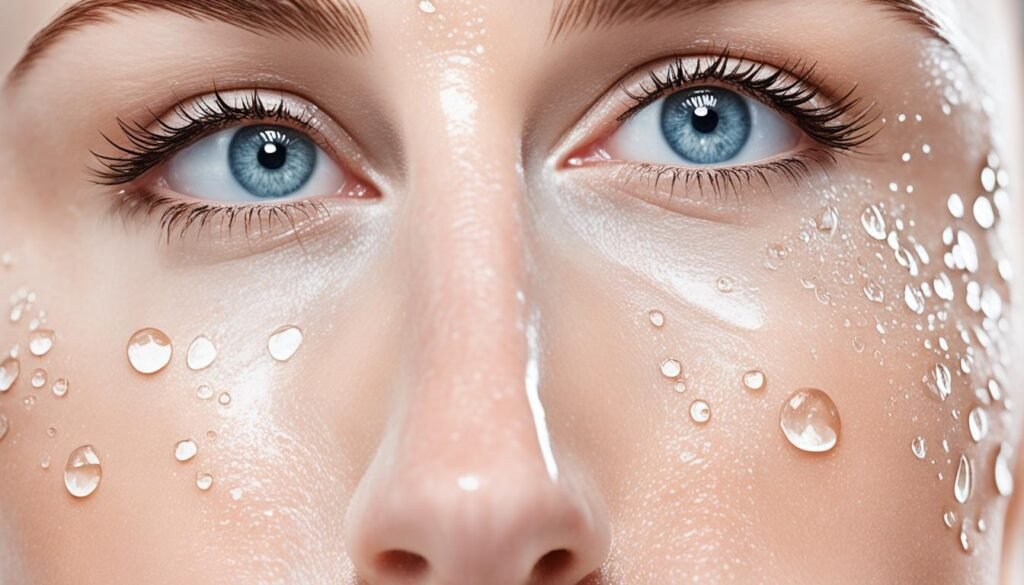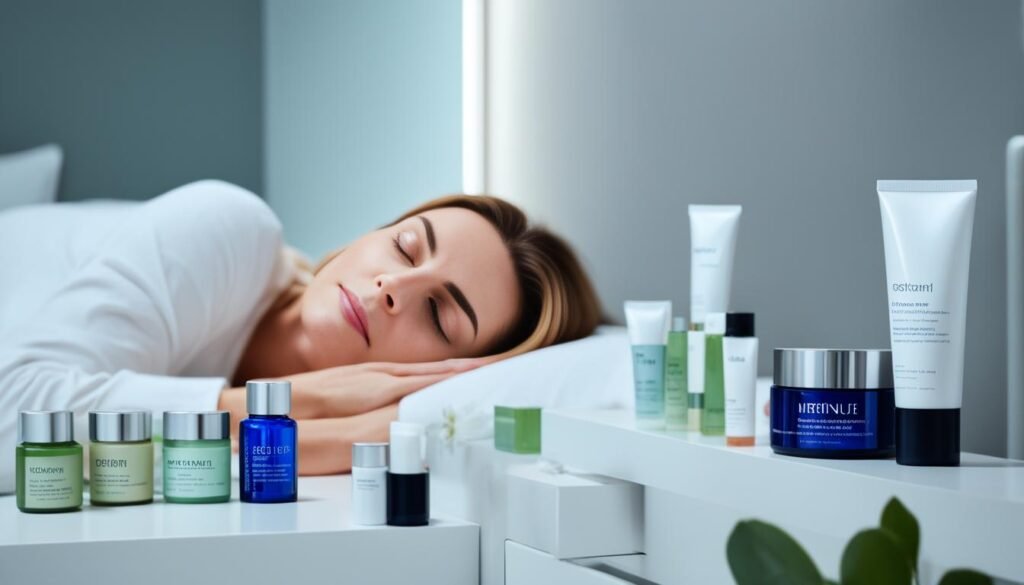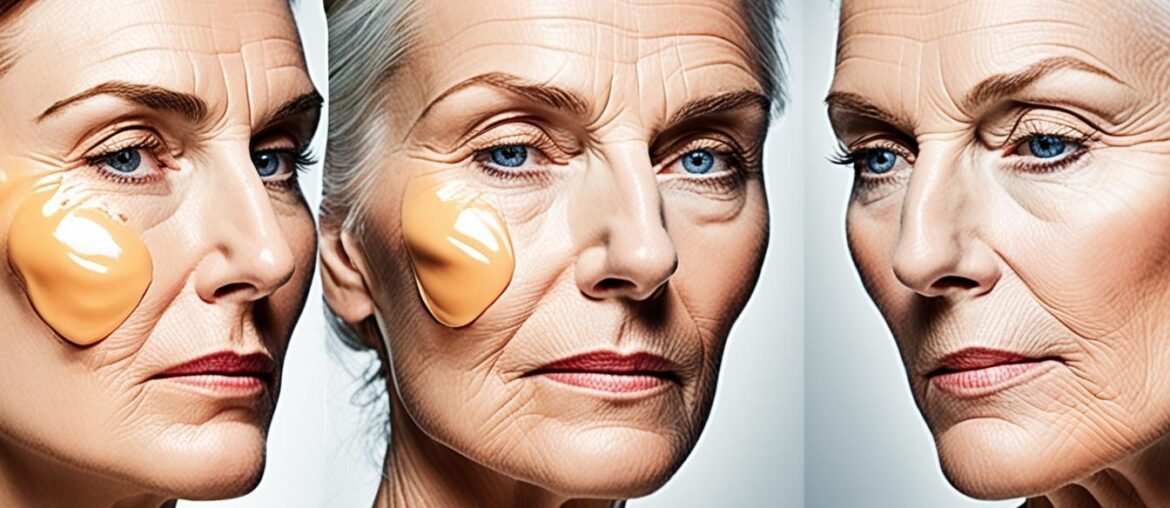Did you know that lack of sleep can accelerate the aging process of your skin?
When it comes to maintaining a youthful and vibrant complexion, we often focus on skincare products and treatments. But what if I told you that the key to healthy skin may actually lie in getting enough sleep?
Multiple studies have revealed a surprising connection between sleep deprivation and premature skin aging. Chronic poor sleep quality can lead to increased signs of intrinsic aging, diminished skin barrier function, and lower satisfaction with appearance. The impact of lack of sleep on skin health is far-reaching and should not be underestimated.
In this article, we will explore the effects of sleep deprivation on skin health, the importance of skin barrier function, tips to improve skin appearance, and strategies to protect skin health and enhance sleep quality. By understanding the connection between sleep loss and skin aging, we can take steps to preserve our skin’s health and radiance.
Key Takeaways:
- Sleep deprivation can accelerate the aging process of the skin.
- Poor sleep quality is associated with increased signs of intrinsic aging, such as wrinkles and sagging skin.
- Chronic sleep deprivation can impair the function of the skin barrier, leaving the skin vulnerable to damage and dehydration.
- Lack of sleep can lead to a dull complexion, uneven skin tone, and the formation of dark under-eye circles.
- Establishing a healthy sleep routine, creating a sleep-friendly environment, and practicing stress management techniques can improve both skin health and sleep quality.
The Effects of Sleep Deprivation on Skin Health
Sleep deprivation can have a significant impact on the health and appearance of our skin. Poor sleep quality has been found to be associated with various negative effects on skin health and appearance, leading to premature aging and an overall tired and aged appearance.
Impact on Skin Aging
One of the primary effects of sleep deprivation on skin health is its contribution to accelerated skin aging. Lack of sleep can lead to increased signs of intrinsic aging, such as wrinkles, fine lines, and sagging skin. The natural rejuvenation and repair processes of the skin are hindered, resulting in a tired and aged appearance.
Effects on Skin Appearance
Not only does sleep deprivation affect skin aging, but it also impacts the overall appearance of the skin. Lack of sleep can cause dullness, uneven texture, and the formation of dark under-eye circles. The complexion can appear pale, and the skin may lack radiance and vitality.
“Sleep deprivation can lead to increased signs of aging and a tired, aged appearance.”
It is important to understand the connection between sleep loss and skin health. Chronic poor sleep quality can diminish the skin’s barrier function, making it more susceptible to dryness, irritation, and damage from environmental stressors.
By prioritizing adequate sleep and implementing strategies to improve sleep quality, we can effectively protect our skin and maintain its health and youthful appearance. In the following sections, we will explore various ways to enhance sleep quality and promote optimal skin health through lifestyle changes, skincare routines, and stress management techniques.
| Sleep Deprivation Effects | Skin Health | Skin Appearance |
|---|---|---|
| Increased signs of aging | Diminished skin barrier function | Dullness |
| Impaired rejuvenation and repair processes | Increased susceptibility to dryness and irritation | Uneven texture |
| Damage from environmental stressors | Dark under-eye circles |
Skin Barrier Function and Sleep Deprivation

The skin barrier is a vital component of healthy skin, responsible for protecting the skin from external factors and maintaining its hydration. However, sleep deprivation can significantly impair the function of the skin barrier, leading to various skin issues and accelerating the aging process.
Sleep deprivation and increased Transepidermal Water Loss:
Transepidermal Water Loss (TEWL) refers to the loss of water from the skin to the surrounding environment. When the skin barrier is compromised, TEWL increases, resulting in dryness, dehydration, and an impaired protective function. Lack of sleep has been shown to disrupt the skin’s ability to retain water, leading to increased TEWL and a compromised skin barrier.
Table: Impact of Sleep Deprivation on Skin Barrier Function
| Effects of Sleep Deprivation on Skin Barrier Function | Consequences |
|---|---|
| Increased Transepidermal Water Loss | Risk of dryness, dehydration, and compromised protective function |
| Slower Barrier Recovery | Prolonged healing and susceptibility to external stressors |
Sleep deprivation and slower barrier recovery:
In addition to increased TEWL, sleep deprivation can also hinder the skin’s ability to recover and repair itself. After experiencing damage from external factors such as UV rays or pollution, the skin relies on its regenerative processes to heal and restore its barrier function. However, lack of sleep disrupts these processes, leading to slower barrier recovery and prolonged healing time.
Sleep deprivation and skin aging:
The impaired function of the skin barrier due to sleep deprivation not only affects the skin’s hydration and healing processes but also contributes to premature skin aging. With a compromised barrier, the skin becomes more susceptible to environmental stressors, such as pollution and UV radiation, which accelerate the breakdown of collagen and elastin, essential proteins that maintain the skin’s firmness and elasticity.
Furthermore, the skin’s ability to replenish itself and regenerate new cells is hampered by sleep deprivation, leading to a slowdown in the natural skin rejuvenation process. As a result, fine lines, wrinkles, and dullness become more pronounced, contributing to an aged appearance.
It is crucial to recognize the impact of sleep deprivation on skin barrier function, as it plays a significant role in maintaining overall skin health and preventing premature aging. The compromised barrier can result in dryness, dehydration, and heightened vulnerability to environmental stresses, accelerating the aging process.
The Impact of Sleep Deprivation on Skin Appearance
Sleep deprivation can have a significant impact on the appearance of the skin. Lack of sleep can result in a pale complexion, uneven skin tone, and a lackluster appearance. It can also lead to the formation of dark under-eye circles and puffiness. When we don’t get enough sleep, our body produces more cortisol, a stress hormone that can break down collagen and elastin, leading to sagging and wrinkles. Additionally, inadequate sleep disrupts the body’s natural repair and rejuvenation processes, hindering the skin’s ability to heal and regenerate.
Improving both skin health and sleep quality is crucial to maintain a youthful and vibrant appearance. Here are some tips to help you achieve better sleep and healthier skin:
- Establish a consistent sleep routine: Going to bed and waking up at the same time every day, even on weekends, helps regulate your body’s internal clock and promotes better sleep quality.
- Create a sleep-friendly environment: Ensure your bedroom is cool, quiet, and dark. Investing in a comfortable mattress and pillows can also enhance your sleep quality.
- Limit exposure to digital screens before bed: The blue light emitted by screens can interfere with the production of melatonin, the hormone responsible for regulating sleep. Avoid using electronic devices at least an hour before bedtime.
- Practice stress-reducing techniques: Engaging in relaxation exercises, such as meditation, deep breathing, or gentle yoga, can help reduce stress levels and promote better sleep.
By incorporating these tips into your daily routine, you can improve both your skin health and sleep quality, leading to a rejuvenated and radiant complexion.
Strategies to Protect Skin Health and Enhance Sleep Quality

To maintain optimal skin health and improve sleep quality, it is crucial to adopt effective strategies that prioritize both aspects. By incorporating these strategies into your daily routine, you can promote skin rejuvenation, prevent skin aging due to sleep deprivation, and experience a restful and revitalizing sleep.
1. Establish a Healthy Sleep Routine
Creating a consistent sleep routine plays a vital role in enhancing the quality and duration of your sleep. Aim for 7-9 hours of uninterrupted sleep each night to allow your body to undergo the necessary rejuvenation process. Stick to a regular sleep schedule, even on weekends, to regulate your body’s internal clock and optimize your sleep patterns.
2. Create a Sleep-Friendly Environment
The environment in which you sleep can greatly impact the quality of your sleep. Invest in a comfortable mattress and pillows that provide adequate support for your body. Maintain a cool and well-ventilated bedroom, as temperature can influence sleep quality. Minimize noise disturbances by using earplugs or white noise machines to create a peaceful sleeping environment.
3. Practice Good Sleep Hygiene
Adopting good sleep hygiene habits can significantly improve the quality of your sleep. Avoid consuming caffeine, nicotine, and alcohol close to bedtime, as they can disrupt your sleep patterns. Limit exposure to electronic devices, such as smartphones and TVs, before bed, as the blue light emitted by these devices can interfere with your natural sleep-wake cycle. Engage in relaxing activities, such as reading or taking a warm bath, to calm your mind and prepare your body for a restful sleep.
4. Follow a Skincare Routine
A regular skincare routine can contribute to overall skin health and combat the effects of sleep deprivation on your skin. Cleansing your face daily to remove impurities and applying a moisturizer to keep your skin hydrated are essential steps. Protect your skin from harmful UV rays by using a broad-spectrum sunscreen. Additionally, consider incorporating products with ingredients like hyaluronic acid and retinol into your routine to promote skin rejuvenation and minimize signs of aging.
5. Nourish Your Body with a Balanced Diet
Proper nutrition plays a key role in both skin health and sleep quality. Consume a well-balanced diet rich in fruits, vegetables, lean proteins, and whole grains to provide your skin with essential nutrients. Certain foods, such as walnuts, tart cherries, and kiwi, have been linked to improved sleep quality due to their natural sleep-enhancing properties. Prioritizing a healthy diet can support your skin’s rejuvenation process and promote better sleep.
6. Manage Stress Levels
Chronic stress can negatively impact both your skin and sleep quality. Engage in stress-reducing activities such as exercise, meditation, or deep breathing exercises to help manage stress levels. Establishing a regular exercise routine not only benefits your skin by improving blood circulation but also helps regulate your sleep patterns. Incorporating stress management techniques into your daily life can contribute to overall skin health and enhance the quality of your sleep.
7. Choose Skincare Products Wisely
When selecting skincare products, opt for those that are suitable for your skin type and address your specific concerns. Look for ingredients like antioxidants, peptides, and hyaluronic acid, which can help promote skin rejuvenation and combat the effects of sleep deprivation on your skin. Remember to patch test new products before incorporating them into your routine to minimize the risk of potential skin irritations.
By implementing these strategies, you can protect your skin from the aging effects of sleep deprivation and promote a rejuvenated and healthier complexion. Enhancing your sleep quality and prioritizing skin health go hand in hand, ensuring that you wake up feeling refreshed and with skin that glows with vitality.
The Role of Nutrition in Skin Health and Sleep Quality
Proper nutrition plays a crucial role in both skin health and sleep quality. Consuming a balanced diet rich in antioxidants, vitamins, and minerals can support healthy skin and improve its ability to rejuvenate. Foods such as fruits, vegetables, whole grains, and lean proteins provide essential nutrients for skin health. Additionally, certain foods contain sleep-promoting compounds, such as tryptophan, magnesium, and melatonin, which can aid in better sleep quality.
Incorporating these foods into your diet can have a positive impact on both your skin and sleep.
| Nutrient | Food Sources |
|---|---|
| Antioxidants | Berries, dark chocolate, green tea |
| Vitamins A, C, and E | Oranges, strawberries, spinach, almonds |
| Omega-3 fatty acids | Fatty fish, walnuts, chia seeds |
| Zinc | Pumpkin seeds, oysters, beef |
| Tryptophan | Turkey, chicken, soybeans |
| Magnesium | Spinach, almonds, black beans |
| Melatonin | Tart cherries, walnuts, bananas |
“A diet rich in fruits, vegetables, whole grains, and lean proteins provides the necessary building blocks for healthy skin and promotes better sleep quality.” – Dr. Emily Sanders, Nutrition Expert
The Importance of Stress Management for Skin Health and Sleep Quality
Chronic stress can have a detrimental impact on both your skin health and sleep quality. The effects of stress can manifest on the skin in various ways, including increased sensitivity, inflammation, and a compromised skin barrier. Additionally, stress can disrupt your sleep patterns, making it harder to fall asleep or stay asleep throughout the night.
To protect your skin health and enhance your sleep quality, it’s crucial to incorporate effective stress management techniques into your daily routine. Here are some strategies that can help reduce stress levels and promote better skin health and sleep:
- Exercise: Engaging in regular physical activity can help reduce stress by releasing endorphins, the body’s natural mood boosters. Aim for at least 30 minutes of moderate-intensity exercise, such as brisk walking or cycling, most days of the week.
- Meditation and relaxation exercises: Practicing mindfulness meditation or relaxation techniques, such as deep breathing exercises or progressive muscle relaxation, can help calm your mind and reduce stress levels.
- Get enough rest: Ensuring you prioritize getting enough sleep each night can help regulate stress levels. Establish a consistent sleep schedule and create a calming bedtime routine to promote relaxation and better sleep quality.
- Prioritize self-care: Take time for yourself and engage in activities that help you relax and unwind. Whether it’s reading a book, taking a bath, or practicing a hobby you enjoy, self-care activities can help alleviate stress and promote overall well-being.
Remember, managing stress is not only beneficial for your skin health but also for your overall physical and mental well-being. By incorporating stress reduction techniques into your daily routine, you can improve your skin’s appearance and promote a more restful night’s sleep.
“Taking care of your mental and emotional well-being is just as important as taking care of your skin. Find healthy ways to manage stress and prioritize self-care for a healthier, more rejuvenated complexion.”
– Dr. Emily Johnson, Dermatologist
| Effects of Stress on Skin | Effects of Stress on Sleep |
|---|---|
| Increased skin sensitivity | Difficulty falling asleep |
| Inflammation | Waking up frequently during the night |
| Compromised skin barrier | Restless sleep |
| Acne breakouts | Insomnia |
The Benefits of Regular Exercise for Skin Health and Sleep Quality

Regular exercise plays a crucial role in promoting both skin health and sleep quality. Engaging in moderate-intensity aerobic activities, such as brisk walking or cycling, for at least 150 minutes per week can have numerous benefits for your skin and overall well-being.
Exercise helps improve blood circulation, ensuring that oxygen and essential nutrients are efficiently delivered to the skin. This promotes a healthy complexion by nourishing the skin cells and supporting their rejuvenation process.
Additionally, regular physical activity can reduce stress levels, which can have a positive impact on both skin health and sleep quality. Exercise has been shown to stimulate the production of endorphins, which are known as “feel-good” hormones, helping to alleviate stress and uplift your mood.
By incorporating exercise into your routine, you can also enhance your sleep quality. Studies have found that regular physical activity can improve the duration and depth of sleep, helping you feel more rested and rejuvenated in the morning. It can also regulate your body’s internal clock, promoting a consistent sleep-wake cycle.
| Benefits of Regular Exercise: | How It Impacts Skin Health and Sleep Quality: |
|---|---|
| Improved blood circulation | Delivers oxygen and nutrients to the skin for a healthy complexion |
| Reduced stress levels | Promotes a calm mind and enhances sleep quality |
| Enhanced sleep quality | Improves duration, depth, and consistency of sleep |
By making exercise a regular part of your routine, you can reap the benefits of improved skin health and better sleep quality. Remember to consult with your healthcare professional before starting any new exercise program, especially if you have pre-existing medical conditions.
The Role of Skincare Products in Enhancing Skin Health and Sleep Quality

Using the right skincare products can significantly impact your skin health and improve your sleep quality. It is essential to choose products that are suitable for your skin type and address your specific skincare concerns. By incorporating the right skincare products into your daily routine, you can support skin rejuvenation and combat the signs of aging caused by sleep deprivation.
Choosing the Right Skincare Products
When selecting skincare products, consider your skin type and specific skincare concerns. Look for gentle cleansers that effectively remove dirt and impurities without stripping the skin of its natural oils. A moisturizer with hydrating ingredients can help replenish moisture and maintain skin barrier function, preventing dryness and irritation. Additionally, wearing sunscreen with at least SPF 30 every day is crucial for protecting your skin from harmful UV rays, which can contribute to premature aging.
“Using the right skincare products can significantly impact your skin health and improve your sleep quality.”
Nighttime Skincare Ritual
Incorporating a nighttime skincare ritual can not only enhance your skin health but also signal to your body that it is time to wind down and prepare for sleep. Consider using products with ingredients like hyaluronic acid or niacinamide to hydrate and rejuvenate your skin while you sleep. These ingredients can help improve skin elasticity, reduce the appearance of fine lines, and promote a youthful complexion.
“A consistent nighttime skincare ritual can help you relax, de-stress, and create a calming bedtime routine.”
Creating a consistent nighttime skincare ritual can help you relax, de-stress, and create a calming bedtime routine. It can also provide a dedicated time to take care of your skin and indulge in self-care, contributing to improved sleep quality.
Skincare Products and Sleep Quality
Using skincare products that are suitable for your skin type and provide the necessary hydration and nourishment can promote better sleep quality. When your skin feels healthy and well-cared for, it can help create a sense of comfort and relaxation that contributes to a restful sleep.
However, it is essential to note that everyone’s skin is unique, and what works for one person may not work for another. It may be beneficial to consult with a dermatologist or skincare professional to determine the best skincare products for your specific needs.
| Skincare Tips for Enhanced Skin Health and Sleep Quality |
|---|
| 1. Choose skincare products suitable for your skin type and specific concerns. |
| 2. Establish a consistent nighttime skincare ritual to unwind and prepare for sleep. |
| 3. Use products with hydrating and rejuvenating ingredients like hyaluronic acid and niacinamide. |
| 4. Wear sunscreen with at least SPF 30 to protect your skin from UV damage. |
| 5. Consider consulting with a dermatologist or skincare professional for personalized recommendations. |
Conclusion
Sleep deprivation can have detrimental effects on skin health and accelerate the aging process. Numerous studies have shown that chronic poor sleep quality is associated with increased signs of aging, including wrinkles, fine lines, and sagging skin. Additionally, lack of sleep can diminish the skin’s barrier function, making it more susceptible to dryness, irritation, and damage from environmental stressors.
To protect skin health and enhance sleep quality, it is important to adopt a holistic approach. This includes establishing a healthy sleep routine that prioritizes 7-9 hours of quality sleep each night. Practicing good sleep hygiene, such as avoiding caffeine and stimulating activities before bedtime, can also contribute to better sleep. Stress-management techniques, regular exercise, and using appropriate skincare products are essential in maintaining a youthful and healthy complexion.
By prioritizing sleep and taking care of your skin, you can promote overall well-being and rejuvenate your skin. Remember, sleep deprivation and skin aging due to sleep deprivation are interconnected, and addressing both aspects can lead to noticeable improvements in skin health and appearance. Invest in your sleep and skincare routine to achieve a radiant and youthful complexion for years to come.
FAQ
How does sleep deprivation affect the health of your skin?
Lack of sleep can accelerate the aging process, leading to premature skin aging. Poor sleep quality is associated with increased signs of aging, such as wrinkles, fine lines, and sagging skin.
What impact does sleep deprivation have on the appearance of your skin?
Sleep deprivation can result in a dull complexion, uneven skin tone, dark under-eye circles, and puffiness.
How does sleep deprivation affect the skin’s natural repair and rejuvenation processes?
Lack of sleep hinders the skin’s ability to rejuvenate and repair itself, leading to a tired and aged appearance.
How does sleep deprivation affect the skin barrier?
Sleep deprivation impairs the function of the skin barrier, making the skin more susceptible to dryness, irritation, and damage from environmental stressors.
What can I do to improve both my skin health and sleep quality?
Establish a consistent sleep routine, create a sleep-friendly environment, limit exposure to digital screens before bed, practice stress-reducing techniques, and take care of your skin through a regular skincare routine.
How does nutrition impact both skin health and sleep quality?
Consuming a balanced diet rich in antioxidants, vitamins, and minerals can support healthy skin and improve its ability to rejuvenate. Certain foods also contain sleep-promoting compounds that can aid in better sleep quality.
How does chronic stress affect the health of your skin and sleep quality?
High levels of stress can lead to increased skin sensitivity, inflammation, and a compromised skin barrier. Additionally, stress can disrupt sleep patterns and make it difficult to fall asleep or stay asleep.
What are the benefits of regular exercise for skin health and sleep quality?
Regular exercise improves blood circulation, delivering oxygen and nutrients to the skin and promoting a healthy complexion. Exercise also reduces stress levels and promotes better sleep.
How can skincare products enhance skin health and sleep quality?
Using the right skincare products, such as gentle cleansers, moisturizers, and sunscreens, can contribute to improved skin health. Creating a nighttime skincare ritual can also help signal to your body that it is time to wind down and prepare for sleep.
What is the connection between sleep deprivation, skin rejuvenation, and premature skin aging?
Lack of sleep can accelerate the aging process, leading to premature skin aging. It hinders the skin’s natural rejuvenation and repair processes, resulting in a tired and aged appearance.




